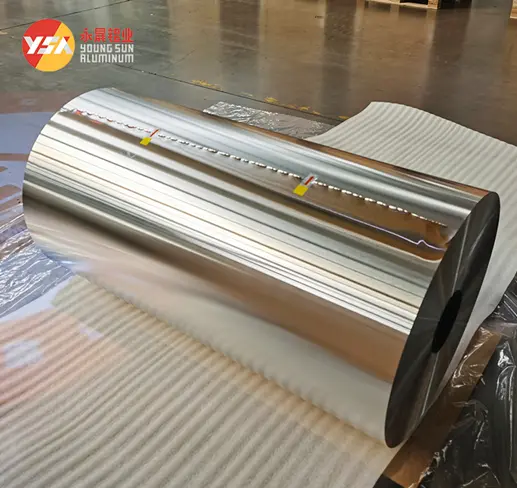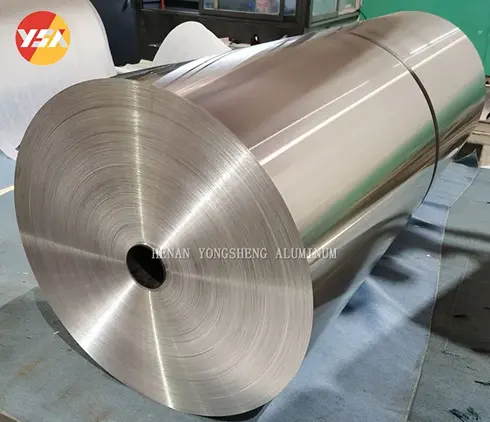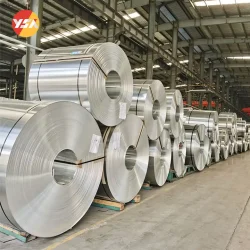Lithium battery foil have been developed all the way from ordinary aluminum foil to carbon coated aluminum foil with the continuous pursuit and improvement of the performance and reliability of lithium batteries and the continuous progress of lithium battery technology. Nowadays carbon coated aluminum foils have become one of the most commonly used collector materials in the manufacture of modern lithium batteries.
Aluminum Foil for Lithium Battery Collectors
In lithium batteries, aluminum foil materials are used for the collector, tab, and outer packaging aluminum-plastic film, and the battery foil we usually refer to actually refers to the aluminum foil used for the cathode material of lithium-ion batteries. Therefore, battery aluminum foil is not literally aluminum foil for battery, but aluminum foil for lithium battery collector.
Lithium battery collector foil is a sheet material used in the manufacture of lithium ion batteries. It plays an important role in the battery, on the one hand, it is the electrode of the collector, and on the other hand, it acts as the carrier of the lithium positive or negative material, which is responsible for the conduction and collection of the current.
Li-ion battery foil is one of the indispensable materials in the manufacture of Li-ion batteries, which has an important impact on the performance and reliability of the battery. It plays a key role in the energy density, cycle life and safety of lithium-ion batteries.
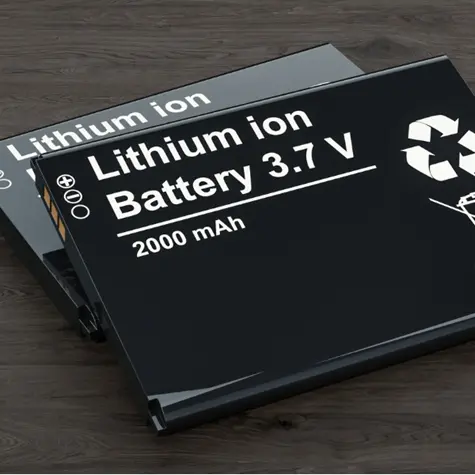
Regular Aluminum Foil vs. Carbon Coated Aluminum Foil
Under normal circumstances, lithium battery foil needs to have high electrical conductivity, good mechanical strength, corrosion resistance and good moldability. It needs to have good electrical conductivity to ensure the smooth transmission of current, and at the same time to have enough mechanical strength to maintain the structural integrity of the battery. In addition, lithium battery foil also needs to be resistant to the corrosive effects of chemicals and the environment inside the battery to ensure the long-term stability and safety of the battery.
The earliest lithium batteries used ordinary aluminum foil as the collector material. Ordinary aluminum foil has good electrical conductivity and mechanical strength, but in the long-term experiments people found that there are problems such as uneven current distribution and corrosion in this kind of lithium battery.
Sulfur coated aluminum foils were introduced to improve the performance of lithium batteries and to address the needs of certain special types of lithium batteries, such as lithium sulfide batteries. Sulfur coated aluminum foils are coated with a layer of sulfur on the surface of the aluminum foil to provide better chemical stability to meet the needs of lithium sulfide batteries.
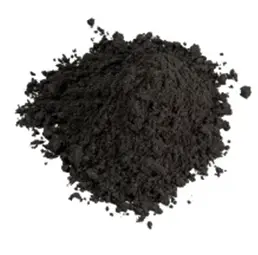
Later, with the continuous development of lithium battery technology, the requirements for battery performance are getting higher and higher. In order to improve the conductivity and current distribution of lithium batteries, carbon coated aluminum foil came into being.
Carbon coated aluminum foil is a carbon layer coated on the surface of aluminum foil to provide better electrical conductivity and current distribution, reduce resistive losses and improve battery efficiency. The introduction of carbon coated aluminum foil has led to significant improvements in energy density, cycle life and safety of lithium batteries. It provides a more uniform current distribution and lower internal resistance, helping to improve battery performance and reliability.
Carbon Coated Aluminum Foil Requirements for Aluminum Foil
Carbon coated aluminum foils have higher requirements for aluminum foils than ordinary battery foils, such as the cleanliness and flatness of the foil surface, as well as chemical stability. This poses a number of challenges to the aluminum foil manufacturing process
1. Surface flatness and cleanliness: Aluminum foil raw materials for carbon coated aluminum foils need to have higher surface flatness and cleanliness to ensure that the carbon layer can be uniformly coated on the surface of the aluminum foil. Improved surface flatness contributes to even distribution of the carbon layer and good adhesion. Higher cleanliness of the aluminum foil ensures that the carbon layer can fully contact and adhere to the aluminum foil. Impurities and contaminants on the surface may affect the quality and performance of the coating layer.
2. Corrosion resistance: Carbon coated aluminum foil requires that the aluminum foil have good chemical stability and be able to resist the corrosive effects of the chemicals and environment in the battery. This helps to maintain the integrity and stability of the coating layer.
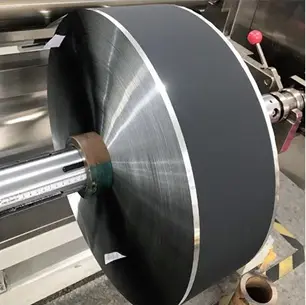
3. Thickness range, tensile strength and elongation: There are slight variations in the range of thicknesses, tensile strengths and elongations required for aluminum foils for different battery foils.
Common Battery Foil: Common Battery Foil requires aluminum foil to have good electrical conductivity and mechanical strength, generally speaking, the thickness range is between 10 and 50 microns (0.01mm-0.05mm); tensile strength is generally between 100 and 200 MPa; elongation: generally between 2% and 5%.
Sulfur Coated Aluminum Foil: In addition to the requirements of ordinary aluminum foil, sulfur coated aluminum foil also needs to have better chemical stability to resist corrosion in lithium sulfide batteries.
Thicknesses also typically range from 10 to 50 microns; tensile strengths typically range from 100 to 200 MPa; and elongation typically ranges from 2 to 5 percent.
Carbon coated aluminum foil: carbon coated aluminum foil requires better conductivity, can provide more uniform current distribution and lower internal resistance, so the thickness requirements are generally more, thin usually between 10 and 20 microns. Tensile strength and elongation are the same as those of the above two types of aluminum foils, with tensile strength generally between 100 and 200 MPa and elongation generally between 2% and 5%.
Yongsheng Aluminum Foil
| Yongsheng Aluminum Foil | |
| Alloy/Grade | 8079, 8021,8011, 8006; 5052, 5A02; 3003, 3004, 3005, 3102; 1235, 1100, 1145, 1050, 1060 |
| Temper | O, Half Hard, H12, H14, H16, H18, H22, H24, H28, H32, etc. |
| Thickness | 0.006 mm ~ 0.2 mm(6 μm to 200 μm) |
| Width | 10 mm ~ 1600 mm |
| For manufacturing carbon-coated aluminum foil: Thickness: 10 to 20μm; Width: 200-300mm. | |
| Yield (MPa) | 0 ~ 560Mpa |
| Ultimate Strength | 70 ~ 550Mpa |
| Application | Carbon-Coated Aluminum Foil, Tape Foil, Food Packaging, etc. |
| Tolerances | As customer’s requirement |
| Standards | ASTM-B209, EN573-1, GB/T3880.1-2006, GB/T 24001-2016, GB/T 19001-2016 |
| Certificate | MTC, ISO9001,SGS, ROHS,DNV,TUV,ISO14001,ABS,CCS,CE |
| Delivery Time | Ready stock: 7-10 days, Future Goods: 15-30 days |
| Loading Port | Qingdao Port, Tianjin Port, Shanghai port. |
| Price Terms | FOB, CIF, CFR, CNF, etc. |
| Payment Terms | 30% deposit by TT, 70% balance before delivery or 100% L/C at sight |
| Quality Control | Mill Test Certification is supplied with shipment,Third Part Inspection is acceptable. |
| Package | Seaworthy Wooden pallet, Wooden case, Aluminum plate case |
| Our Service | We can provide you with free samples and various custom services. |
| Place of Origin | Huiguo Town, Gongyi City, Henan Province, China |
Advantages of Yongsheng Aluminum Foil:
1. Clean and Uniform Appearance: Yongsheng aluminum foil for carbon-coated aluminum foil has a clean and uniform color without spots, ensuring a smooth surface without pinholes.
2. Strict Quality Control: Yongsheng strictly controls the width and thickness of the finished products, ensuring that the thickness fluctuation is within 4%. This ensures consistent quality and performance of the foil.
3. High-Quality Slice: Yongsheng ensures the quality of the slice, with no burrs, tower shapes, or other irregularities on the end face, resulting in a smooth and clean foil.
4. Defect-Free Surface: The aluminum foil from Yongsheng has a smooth and defect-free surface. It is free from edges, oil spots, black oil spots, bright lines, roller printing, concave, and convex points, ensuring high-quality and visually appealing foil.
5. Strong Mechanical Properties: Yongsheng aluminum foil exhibits strong mechanical properties, including high tensile strength, blast resistance, puncture resistance, and tear resistance. This ensures durability and reliability during use.
6. Secure Welding: When used in battery manufacturing, Yongsheng aluminum foil ensures a firm and secure welding with the pole ear, minimizing the risk of detachment.
7. Moistureproof and Oxidation Prevention: Yongsheng pays attention to moistureproof packaging during transportation, preventing oxidation and preserving the quality of the aluminum foil.
8. Stable Quality and Long-Term Supply: Yongsheng is committed to providing stable and reliable quality aluminum foil for carbon-coated applications, ensuring a long-term supply to meet customer demands.
FAQ: Other Aluminum Foil for Lithium Battery Collectors Besides Carbon Coated Aluminum Foil
In addition to carbon-coated aluminum foil, other types of aluminum foil can be used for lithium battery collectors. Below are a few common aluminum foil materials:
- Non-Carbon Coated Aluminum Foil: This is a common aluminum foil material that has not been coated with a carbon layer. It has good electrical conductivity and mechanical strength and is suitable for some lithium battery applications that do not require high electrical conductivity.
- Sulfur Coated Aluminum Foil: Sulfur coated aluminum foil is a material with a sulfur layer coated on the surface of aluminum foil. It is commonly used as a collector in some special types of lithium batteries, such as lithium sulfide batteries (e.g. lithium sulfide batteries).
- Tin-coated aluminum foil: Tin-coated aluminum foil is a material with a tin layer coated on the surface of aluminum foil. It is mainly used for some special types of lithium batteries, such as the collector in lithium-tin alloy batteries.
These different types of aluminum foils have specific applications and advantages in lithium battery manufacturing. Choosing the right aluminum foil material depends on the battery design requirements, the type of battery, and the required electrical conductivity and chemical stability.


